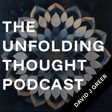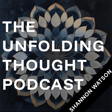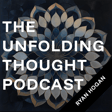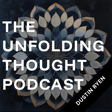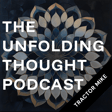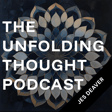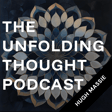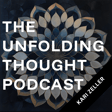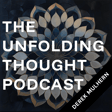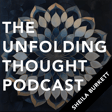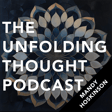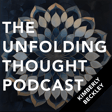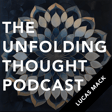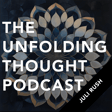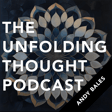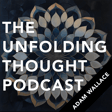Introduction to the Podcast
00:00:03
Speaker
Hi, I'm Eric Pratham. Welcome to the Unfolding Thought Podcast, the show for leaders and deep thinkers who demand more than the usual fluff.
00:00:15
Speaker
If you're the kind of person who moves on from a book, video, or podcast the moment it stops making you think or introducing you to something you can use, I hope you'll feel right at home here.
00:00:30
Speaker
In each episode, we uncover the deeper, often overlooked forces that shape our thoughts and behaviors. So you can see yourself, your team, and the world from a whole new angle, and then actually apply what you learn to grow and do better.
Podcast's Mission of Insightful Content
00:00:48
Speaker
On the Unfolding Thought Podcast, we aim for minimal filler and maximal insight, challenging assumptions and sparking new thinking every step of the way.
00:01:00
Speaker
Are you ready to dive deeper? Then let's get started.
Guest Introduction: Dan Roos
00:01:05
Speaker
Today I'm speaking with Dan Roos, an experienced designer turned innovation catalyst whose background spans building wild theme park attractions to orchestrating corporate light bulb moments.
00:01:19
Speaker
Dan has spent years helping communities and companies break out of outdated assumptions, discover unexpected allies, and spark change. Whether it's hosting live disruptive diners or, as I've experienced, facilitating a sense of awe and breakthrough with a simple guided exercise on a tear-off pad, Dan keeps returning to one big question.
00:01:45
Speaker
Why are we doing this? And does that why actually move the needle? And now, I bring you Dan Roof's.
Dan's Transition to Experience Design
00:01:56
Speaker
Dan, would you mind telling everyone a little bit about your background? I am somebody with a short attention span that has learned how change happens in the world. And I have learned how to support other people like that in the change that they wish to see in the world.
00:02:14
Speaker
I was a physics student because i'm it I was interested in big systems and how things work interdependently.
00:02:27
Speaker
happened to have ah summer job working for a theme park company, and I was really interested in rides and attractions and all of that stuff, which is the area I worked in.
00:02:40
Speaker
I happened to be there at a time that they were acquired by a big entertainment company. And i was ambitious. And so the opportunity was like, hey, Dan, you know, I was making next to nothing because it's a summer job.
00:02:54
Speaker
But I would just volunteer for all kinds of things. We need somebody to produce the concert series. How hard could that be? You know, we need somebody to design a haunted house and make sure it gets built so we can open it. How hard could that be? Like, I was foolish and full of chutzpah and not a lot of common sense.
00:03:12
Speaker
And so i I became an experience designer. So physics to experience design. And then ah gradually I got tired of working 80-hour weeks and, you know, living on ramen noodles and leftovers from concert catering.
00:03:27
Speaker
And I moved into the world of marketing and in a field called experiential marketing. so those able things were able to come together. And I worked for some period of time
The Importance of Asking 'Why'
00:03:40
Speaker
in that. And I got really good at just asking, what you know, why do you want to do that? Like, why do you want to have a touring version of your factory?
00:03:49
Speaker
What does that accomplish for you, Mr. Chief Marketing Officer or whatever? Yeah. Or people would be like, oh, well, we need you to accomplish X, Y, Z. And I'm like, well, that doesn't exist, but I'll figure it out.
00:04:02
Speaker
And so, yeah, I'll make a system that makes it smell like your car as it's being assembled while you watch a film of the car. I've never done that before, but I'll do that. So I was inventing things.
00:04:13
Speaker
And gradually that moved me into inventing whole projects. And so I would become this innovator that was like, figure out how we can do something with all of these clients that does something around this major sporting event or whatever.
00:04:28
Speaker
Okay, I'll figure that out. I didn't realize what I was learning how to do was become an innovator. Like I was learning how to think about the experience, think about systemically how it worked in different things.
00:04:40
Speaker
And gradually think about what is it accomplishing? What is the strategy? Think about how do you go to market? How do you build something that's never been built before? And how do you get somebody to pay for that?
00:04:51
Speaker
Gradually, I just, I got tired of doing that and decided I wanted to really support innovators. And so for the last 12, 13 years, I've had a small consultancy called Openly Disruptive where I help innovators innovate.
00:05:07
Speaker
That's interesting. Thank you. I really appreciate the way that you put that there at the end, because i think you're getting to something that I wanted to dig into with a portion of your background.
00:05:22
Speaker
And that is, it seemed to me you introduced an interest in the why behind what you were doing. Did that question of why are we doing this or Even what are you trying to accomplish and why are you trying to accomplish that?
00:05:41
Speaker
Did that just show up at some point? Or for you, where do you think that came from? You know, the why for me actually started emerging when I worked for the theme park company because there was suddenly an effort to invest a lot in the parks and to tie it all back to the intellectual property that the company owned.
00:06:03
Speaker
And this isn't exactly how it happened, but the story is conveniently packaged. So i'll I'll tell it this way that like I used to get this, call these weird calls and I would, somebody would say, Hey, we want to have this superhero fly from the top of the roller coaster down to the front gate to unlock the front gate every day.
00:06:22
Speaker
Can you figure out how to do that? And I'd be like, sure. And I would talk to the people that, and and these were, you know, weird calls to have, you know, figure out who makes Peter Pan fly on Broadway and like, how far could you fly somebody, could you know? And so I would call up whatever company that was and I'd be like, I'm supposed to do this. And they're like, well, you know, I mean, the furthest we've ever flown somebody is about a hundred yards. so That's pretty far, you know? I'm like,
00:06:46
Speaker
All right, and now you do and I would figure it out and I would contact that person back at the corporate office and say, so it'd be about a million and a half dollars. and Not really sure exactly what the point of this thing was. And I would ask questions like, so is the goal to make it look like you can't see the cables or is it okay to see the cables? Or, you know, I would ask questions. And then inevitably at that time for every 20 crazy ideas like that, I got called about, we would only produce one of the things.
00:07:17
Speaker
And so I finally was like, why do I keep doing all of it? I mean, it's really interesting. I'm getting paid. I mean, I'm getting paid like an intern, but I'm getting paid to write up a memo on here's how we would make this character fly.
00:07:28
Speaker
And so finally I asked and somebody said, well, you know, you're talking to the IP attorneys in licensing. And the deal is that the parent company has rights, holds the rights to that character, but they have to exercise the rights. They have to show whoever, you know, usually the estate of whoever was created the thing, they have to show that they're trying to make money with it. So what they're trying to do is they're, they just want a piece of paper to put in a file to say, I talked to Dan on Thursday and here's what they would do. And as soon as we get funding, we'll do that. So like that satisfied the needs people.
00:08:06
Speaker
I don't know that this is an actual legal term, but what I called it was like they were exercising the IP and they were just trying to. And I was like, oh, so we don't actually have to do this thing. We just have to plausibly have a clever conversation about it.
00:08:22
Speaker
And then that let me have a lens to look at why are we designing a haunted house? Well, the the the the why of a haunted house is to scare people. oh So what we're trying to do is we're trying to scare people just enough to make money at the box office predictably during a month of the year in the fall.
00:08:38
Speaker
Oh, okay. So I learned how to build a strategy statement based on like, why am I getting these crazy calls? And that I then took to the marketing world unknowingly.
Evolution of Experience Design
00:08:50
Speaker
So when I got to the marketing world, you know I was the foolish person on the team that you know everybody else is like, well, the CMO wants to do X, Y, Z, and they want to spend millions of dollars doing it. and And I was the one like, well, why? you know What are you trying to accomplish with that? And don't ask the CMO that. And the CMO would always be like, no, I'm glad you asked.
00:09:08
Speaker
So the why became just, I'm i'm really fortunate. that I just did enough crazy stuff that finally I was like, there's got to be a why here. So you were designing experiences through the theme park.
00:09:26
Speaker
And then think when you described yourself, It was actually when you mentioned going into the corporate world that the phrase experience design, I believe, came up.
00:09:40
Speaker
And yet, at least as far as I conceive of it, that kind of experience design, you know, having someone fly over the park down to the gate or whatever it was that you were working on.
00:09:53
Speaker
is quite different from the conception of experience design that I find in the marketing or broadly the services world. You picked up on that. So I started like then because people would just come with these things, but you have to like put a budget around it. You have to put some, you have to give it some form and whether it would be ah phone manufacturer.
00:10:16
Speaker
And I want people to have an experience around my phone. Well, it's like, well, okay, well you can put it in their hand, but what, you know, what is an experience that makes that phone come to life?
00:10:27
Speaker
And most of the cases it's the brand come to life. So it's like, okay, so I'm going to make sure that you have the phone and I'm going to make sure that we use the materials that you see on the phone. So if it's got Chrome edges or whatever, that that appears in a lot of things, or if that, if,
00:10:44
Speaker
Red is the dominant brand color. We're going to make sure that appears everywhere. But then we're also going to pick up on what are the things that you see in the brand. So what are the brand stories? What are the commercials? What are the you know the YouTube videos? What are all of the videos that are part of the mythology of that brand? And so if it's like this, you know, the phone gives you premier, you know, like velvet rope access to celebrity influencer kinds of experiences, then we make sure that there's a velvet rope that,
00:11:14
Speaker
You know, there's no need for a velvet rope to be there, but we make sure that the velvet rope gets dropped you get to walk in. And you end up playing with all of those things. And that works even
Experience Matrix for Brand Consistency
00:11:24
Speaker
in the B2B world. I did a lot of work with a client in the logistics space. So it's not about it's not about trucks. The trucks are a way to manifest what is going on about understanding where everything is in the world and how to get it to people as efficiently as possible to delight them.
00:11:43
Speaker
Boxes and trucks that are needed for that, but a logistics company is not a box and truck company. A a logistics company is really a fulfillment company, not in the sense of marketing fulfillment, but in the sense of emotional fulfillment.
00:11:57
Speaker
And once you understand that, then you can create an experience. you know i i mentioned earlier, you i have it's not that I have a short attention span. Sometimes I can really overthink things for decades, but I move on to a lot of different interests. And one of the things was it was hard to explain this to people. So I created something that was just really...
00:12:17
Speaker
A grid that I called an experience matrix. And I said, so here are the beats. And what I observed was that what we really want to do is we want to create an experience in people's head. That is a narrative that if I do this and then this and then this, I will feel this way and this will happen.
00:12:32
Speaker
And then we want to pay that off in the real world. You know, so then we want actually want to do that thing. And then we want to remind them, you know, so it's the old, tell them what you're going to tell them, tell them, and then tell them what you told them.
00:12:46
Speaker
And so then the last thing is I want to then repeat it and say, so here's what you, you know, here's how you were transformed. And so what I would do is like, so, you know, using the velvet rope analogy, if we were going to do that, the email that invites you to this event or the billboard that says you ought to attend it or whatever,
00:13:03
Speaker
should have the velvet rope on it. You should know that the velvet rope, by the time you show up, you know that the velvet rope is a cure. And then you do the thing and you promise, what is it? What am I going to feel like? But I give you it that in some way that's tangible. So I give you some image of what's going to happen. And and either that I describe that image to you or actually give you a rendering or a photograph it or whatever.
00:13:26
Speaker
So you get, oh, when I get past the velvet rope, suddenly I belong You know, I'm an A-lister or whatever. So we find a way to convey that to you. So like this experience matrix was like, so two weeks before somebody shows up, they need to be aware of the velvet rope.
00:13:42
Speaker
And then in that period of time before they show up and they're like, oh, that seems kind of cool, but I don't know that a velvet rope is going to be like, then we remind them they're going to be transformed. And then they're like, oh, and then we remind them that they're going to be an A-lister.
00:13:54
Speaker
And then when they show up, they expect that, but they don't know what it's going to look like and everything. But I've now built, they've they got that conceptual story. in their mind and they know what's expected of them.
00:14:07
Speaker
And then they follow up And then afterwards, I have to make sure that when I send you the picture of you entering the velvet rope, I, that I'm telling the photographer, you know, take 20 pictures, but make sure you flag the ones where it's got a look of wonder on their face.
00:14:21
Speaker
Cause that's the money one that we want to make sure they get. But nobody had ever done this kind of thing, this experience matrix. And really I did it just to, you know, because people like, it seems like you just want to throw a lot of money at this. I'm like, no, I i only want to throw money at these 20 things that are on this table.
00:14:36
Speaker
So it was a way to keep everybody honest. And also so that everybody didn't think, you know, like, well, we're going to, you know, get the premier Venetian velour to make the velvet rope. But people are going to be there for 0.5 seconds. It just has to look legit as a velvet rope. It doesn't have to be a real velvet rope.
00:14:54
Speaker
You know so it was a way to prioritize those things.
Running a Consultancy
00:14:57
Speaker
You've been running your business Openly Disruptive for how long now? 2012. It was when TED conferences were becoming really popular.
00:15:08
Speaker
And I knew that the kinds of people that cared about TED were the kinds of people that were my my people to serve. And I struggled for a while at figuring out how to make money with Openly Disruptive because these people are busy.
00:15:23
Speaker
And they're interested in their own thing. They're not interested in what Dan has to say. And so I started out really trying to be like, so here's what's important in the world, Eric. So here's what you ought to care about because Dan says you ought to care.
00:15:36
Speaker
Well, if you're truly innovative, you don't really want to hear that because you don't want to say, well, I got started on this path because Dan suggested it. You want to say, here's how Eric came up with it. And so it took a long time to figure out how do you actually serve innovators?
00:15:51
Speaker
And that's really been the most recent part of the journey is figuring out, yeah, it's really, you know, ideas. are a dime a dozen. It's the people that are capable of making those ideas come to life are not taken care of. We need to serve those people better.
00:16:07
Speaker
And that's what I'm most interested in nowadays. For everyone listening, I believe one of the first times that I encountered Dan, maybe the first time, was on the recommendation of Jeremy Newick, who I also talked to on this podcast and I was setting up an event that was generally focused around innovation and new thinking, but primarily for people that were working in social media in the St. Louis area.
00:16:40
Speaker
And Jeremy Nulik recommended Dan and Dan gave one of the most memorable presentations that I've ever seen. And I think it was shown by what occurred after the event, maybe a third of the people. It was quite a large portion of the attendees.
00:17:02
Speaker
stayed just to hear from Dan a little bit more informally. And the presentation was fairly informal as it was. But while talking to Dan, then Dan pulls out this notepad that was something he had developed for his business. And you'll have to describe it because you've described it to me before and I forget all of the details, but it was both a structured in the sense of, you know, something had been laid out and planned in advance.
00:17:34
Speaker
It was a structured tool, pre-planned tool, and yet also something that I think helped to uncover or bring to the level of consciousness, ideas, goals, and potential even for what those listeners were working on.
00:17:56
Speaker
And so I share that. in part because Dan's working with innovators and has a lot of experience with events and developing experiences.
00:18:09
Speaker
And my first experience was actually quite impressive and quite practical. Now, I've said a lot here, but could you just for a moment explain a little bit of that notepad that I was talking about.
Tools for Innovators
00:18:26
Speaker
And I don't know if that's something that will be accessible or anything, but for me, that stuck with me.
00:18:32
Speaker
I really love that you picked up on that. So the notepad that Eric is referring to, it came very selfishly from, talk to hundreds of people a year, founders and people that really want to change the world and stuff, innovators.
00:18:45
Speaker
And to be honest, some of them are crackpots and some of them are real wonderful people that are going to accomplish things. And even the crackpots are wonderful people, but I, I needed to figure out like, was there a there there?
00:18:57
Speaker
And I started off, I would just talk to those people and I would have coffee and I'd have lunch with them and try and they would bring binders and all of this stuff about what they were working on. and And this literally happened with me in one conversation.
00:19:11
Speaker
When I was like, finally, I was like, so wait a minute, are you talking about a perpetual motion machine? And this guy looked at me like the red thread guy in the meme. He looked at me with that kind of face. He's like, yeah, but you can't call it that because they think you're crazy. So I call it a periodic motion machine.
00:19:27
Speaker
I was like, because remember, I make my living as a consultant. I'm like, this is never going to go anywhere. But because I had the empathy that I had for people that I had developed with like that of experience matrix where like, I get that I have to give you something for you to know, to trust me, to let me in.
00:19:43
Speaker
And I need to understand you enough to know what you're doing. And so I came up with these pads and what they are. I i thought I was going to develop but tablet app that was going to do this really slick and everything.
00:19:54
Speaker
But my MVP was just to make these up. So in PowerPoint, I just made a little mind map. And I printed them out and had them put on pads, like, you know tear off pads, like you, you know, see forms.
00:20:07
Speaker
And i was like, well, version one, I'm just going to test it. And once I get this really refined, I'm going to use it over and over again. And it's just a way to get to articulating with somebody what they're doing, get from the vagueness that an innovator has to a vision of here's what it actually is.
00:20:22
Speaker
Here's how it's going to work. Here's how it can go to market. And it's meant to be the thing that you do before you do the business model canvas, before you hire, you know, anybody or whatever. And it's just to get the two, the innovator and the person that can help them on the same page.
00:20:37
Speaker
And what I discovered when I did that was when I tear it off of there, ah people be like, Hey, can I have that? And I'm like, Oh, well, let me put my contact information on it. And then they would contact me back and say, when you did X, Y, Z, but it became the thing that we talked about that what I was doing was helping them articulate something that they weren't able to articulate before.
00:20:57
Speaker
And gradually I extended that. So the, the tear pad that I carry with me ah to most events is the first of, there's actually four tier pans tear pads that are like, so if you really don't understand where you're creating value, here's a way to think about really understanding the new economic value.
00:21:15
Speaker
If you don't really understand what, how to have empathy for the people that you're trying to transform help transform, here's a way to do this. If you don't really understand, you know, how do I go from a user to 100,000 users?
00:21:29
Speaker
Like, what does that look like? And when do I need to have a CTO and all of this other stuff? And then what I also learned was helping people understand when they, you know, how much gas they have left in the tank and when they need to stop, but just put it on pause, and you know, because it's going to drive the nuts.
00:21:46
Speaker
Because us innovators will pursue things. long after it's in our best interest because we want our idea to come to life. And so sometimes it's like, yeah, I believe in this, but the time is not right. So I'm putting it on pause as while I do this.
00:22:00
Speaker
So it became a set of tools for helping people articulate that. But mostly they're useful for helping me understand, you know, the person I'm talking to, how I might help them and where I can't help them, where they're working on something that is useful.
00:22:13
Speaker
so far in the future that it's not responsible for me to help them until some things in the world change you had a lot of experience with developing in-person experiences then i'm not totally clear on when you went into the corporate world how much you were working on events but as soon as we talked about you going out and doing your own thing with openly disruptive, you promoted your business through events. And then i know that you have done a fair amount of events and event design and
00:22:53
Speaker
and supporting activities in the subsequent years. So I'm wondering one, if you could give us some sense of the kinds of events that you've done and why you've done them, I guess, perhaps both with openly disruptive and or with your clients.
00:23:15
Speaker
And then also what you've learned from doing events, you know, a lot has transpired between 2012. And now we're recording this in February 2025.
00:23:27
Speaker
So one of my early clients was the
Collaborations and Partnerships
00:23:32
Speaker
St. Louis Science Center. And it was the president and CEO was ah at the time, was a brilliant man, burt um Bert Bascalani.
00:23:41
Speaker
And he had ah fantastic program director, Dr. Christian Greer. And they realized that the science center should be a place where innovators go to get ideas and to get inspired and everything.
00:23:57
Speaker
And so I got the opportunity to help them figure out, because I was working with startups and founders and, you know, you know hackers and people like that. And we realized that there was an over, there was a Venn diagram of the interest that they had and the people that they were seeing at the science center. Now you had the families that were bringing their five-year-olds to learn about electricity or whatever, but you had other people that came that came multiple times and they were looking at how to play with an exhibit or do something different.
00:24:27
Speaker
And we came up with a persona of what these people were and we called them active creatives. So people that learn, by doing and by being creative. But they might be, because I, the number of coders that are musicians or dancers or that I go to South by Southwest, but I also go to Burning Man and all of those kinds of things, you know, finding the overlap between those audiences.
00:24:56
Speaker
And that was really powerful because then we started thinking about what can you do? And they were doing it at the time, ah ah a thing on every Friday night where people could come up and just, you know, like if you, you know, if you had a maker space with your first 3d printer, set up a table and show people about it.
00:25:10
Speaker
And by the way, we're showing this episode of Dr. Who on the IMAX screen. And You know like all kinds of stuff for all kinds of geeks. And that was the first time to really think about the audience I served and who were my people.
00:25:29
Speaker
And that's been something I've refined over time. But it was really powerful to think about what do those people want and really what those people want. is They want to do something that to them has never been done before.
00:25:42
Speaker
Now, it may have been done before, but to them it's never been done before, that allows them to express their uniqueness and allows them to tie that into the lo larger world, why this matters in the larger It was really powerful to understand what an innovator needs to be sustained.
00:26:01
Speaker
It seems to me that doing something in the physical world, imagining it comes with an also high imagined price tag and investment value.
00:26:14
Speaker
You know, if I nowadays want to introduce a new product, of course, I can reach a lot of people online, but I also have the opportunity to develop a video, perhaps using generative AI and the quality is getting better and better.
00:26:35
Speaker
But if I'm a leader of some type, whether I have a startup or I'm in marketing, or I'm a product manager, or any number of other things, I think it's easy to imagine, maybe I shouldn't think about an offline experience.
Understanding MVP and Innovation Challenges
00:26:54
Speaker
Because if I think about having an MVP, you mentioned the MVP of your tear-off pads. It's a bigger investment, which means I need to get a bigger win. And yet you're dealing with innovators. You desire to work with innovators.
00:27:11
Speaker
So I'm curious about your perspective on balancing Small and quick investments and successes with someone's long-term ambitions for driving a disruptive project, disruptive growth, and you know growing their business or product.
00:27:35
Speaker
I think you're really onto something because, you know, i think a lot of people, especially innovators, have heard the term MVP and they don't actually understand what an MVP is, what its purpose is, and how to get the most value from it.
00:27:46
Speaker
An MVP is is an artifact that helps you learn as much about the product, the market, and the fit as rapidly as possible by being as close to what is going to happen as you can do in the timeframe of the resources you have.
00:28:03
Speaker
So there are people that think putting up a website is an MVP. An MVP is not a website. you know and And then they're waiting for, well, I didn't see how many clicks or whatever. The value of a real-world MVP where you're actually with somebody is you're getting feedback.
00:28:17
Speaker
you know When I give you this and you do it, what do you think of it? You know, what are you thinking about? How does it, you know, what what do you accomplish with it? What do you, you know, what's the what's the job to be done? there's You know, that's a big part of it.
00:28:29
Speaker
And so if you create an MVP that is just a digital thing, especially, you know, you use, you know generative AI to come up with, well, here's what it looks like.
00:28:41
Speaker
If you can't put that in a story of how somebody uses it, you're not getting any real feedback. You're getting a response to a particular visual. But people respond to a lot of visuals by swiping left and right.
00:28:55
Speaker
They're not giving real feedback. It's not actionable. Now, you can show, here's this mid-journey image of a product. What do you think this product does? That's giving you real feedback.
00:29:07
Speaker
Or if you saw this, what how would it be packaged? That's real feedback. And that's the kind of stuff that you need. But you can't really do that with a purely digital artifact.
00:29:19
Speaker
And I want to say something else here that I think the biggest thing about my empathy that I have for innovators is we have to have an enormous amount, enormous amount of chutzpah.
00:29:31
Speaker
I mean, we have to be able to like, here's what I'm thinking. And can you make that happen? Sure. I wave my hands and things happen because we're building followers. And the reality is we have a lot of fear, but you can't talk about that fear.
00:29:44
Speaker
So the fear is like, I don't know, will this work? Will this not work? Will, you know, will people help me? Will people not help me? Has somebody beat me to the punch? Like there's all of these fears that are underneath it. And it's really easy to hide behind something that's off-putting to say, hey, here, this mid-journey picture is everything, you know, because you don't want feedback. But we have to be better getting feedback.
00:30:07
Speaker
It's the idea, you know, like we're going to get rejected. We will get rejected far more than we get accepted. More people will say no to buying our idea than we'll say yes at first.
00:30:18
Speaker
And so I just have to build this. It's not a thick skin. It's just, I know that the, the S rate is 1%. I have to get, you know, like I have to, at some point the 99 knows, I have to be like, thank you for that. No. Cause it's getting me closer to the yes.
00:30:33
Speaker
And I have to be okay with the idea of rejection and get over that because otherwise I'm not going to get any real feedback from the world. And that's hard. That's hard for any human. i mean, we're humans. That's very hard for humans, but it's really hard for us as innovators because this beautiful thing only exists in our mind. I probably don't have a way to put it into words.
00:30:55
Speaker
I probably don't have a way to put it into numbers, but I want to see it come to life. Dan, i believe that I recall that you've said before, either in our discussions or in some events, that you feel it's important for innovators to not just go off alone to the mountaintop or whatever it is and innovate alone.
00:31:25
Speaker
but rather to find their community in one form or another and to find allies. And I'm guessing that you can look at this a lot of different ways, but I think you're starting to hint at that with what you just said.
00:31:41
Speaker
So I'm curious whether you think about it as innovators need to go and find a maker space, or if you're in a bigger business, you need to find your allies within that business so that you can remove roadblocks to innovation or whatever else it might be.
00:32:00
Speaker
I'm really curious how you see innovators needing to find support and community.
Managing Innovation through Communication
00:32:07
Speaker
Yeah. Throw a little plug in here. I run a, an event series online called the disruptive diner, which is really a recreation online of those events that we used to do in person when I first got started.
00:32:19
Speaker
So an innovator is, is a person. And in my mind, You know I built this, you know, starting with that actively creative understanding that I got the opportunity to work on to really build kind of a psychographic profile or build a persona of an innovator.
00:32:35
Speaker
And then what I realized is that, you know, we don't expect somebody to become a great basketball player. by being born intrinsically a great basketball player and being waited and and waiting to be recruited by the right college and waiting to be you know go to the right pro team.
00:32:53
Speaker
And then they're perfect. It's a lot of practice. And so an innovator requires a few things. So an innovator needs to be in a place where people see opportunity.
00:33:04
Speaker
you know Like, wow, that would be really amazing. What would happen if we replaced all of the combustion cars with electric vehicles? What would that look like? And to kind of like, but that would be interesting. How would that matter to us or whatever?
00:33:17
Speaker
So you need to have those kinds of conversations. You need to have a way to do something. you It's like the purpose of an MVP is to test something and get some kind of response to it. So you get some small wins. Even if the win is, you know, it's a great idea. The world's not ready for it.
00:33:35
Speaker
You know, Eric, ah go back to your day job. That's still a win. you know But you need some small wins, so you need to practice putting yourself out there, accomplishing something, selling it, and and and and having something go well.
00:33:50
Speaker
You need to have this ability to be around people that are, this comes from improvisational theory, this yes and, where you don you know like where you have to accept the status quo as it is and build on it.
00:34:02
Speaker
um So if you're around or a lot of cynics and stuff, as that's okay as long as you have permission to practice like, that really sucks, but here's what I think we could do about that and have people follow along. So if you get to practice that, that's really good.
00:34:16
Speaker
So, and then the last thing is you have to be able to really learn how to manage up, down and across. So like have to be able to manage myself.
00:34:28
Speaker
I have to be able to manage anybody that reports to me and managing is not just telling people what to do. It's that ability to get them to step to a higher level. So if I have people reporting to me, I'll be like, oh, that's really interesting what you did today, Eric.
00:34:43
Speaker
Is there a way that you could do that 10% better tomorrow? i'd I'd be curious to see how you could do that. Like that ability to get more out of the people working for you. And then you have peers and you have to be able to say, I know you know what we do here in finance doesn't really matter to you in operations. And in fact, you think we're annoying because you think that we're, you know, we're the bean counters that keep you from succeeding. But what happened if we actually found a way to cooperate on a metric that was win-win or whatever? So like find a way to engage those peers at your level. So manage across.
00:35:18
Speaker
And then you have to find a way to manage up and, you know, Managing up does not mean i tell the CEO what to do, but it's, I learn how to say, hey, I really love working here and I'm seeing some great opportunity for us to someday see 10X growth.
00:35:35
Speaker
Love to talk to you about it sometime. But like learning, you know, having that, kind having those conversations are really important. But those are all skills that everybody thinks that's the idea. And if I have the idea, then everything will magically solve itself.
00:35:49
Speaker
It's what you do when you have the idea that's way more important. When you talk about managing up, it sounds to me like one of the tactics, if I can call it that, that you were able to use earlier in your career was asking why, perhaps in part because the people who wanted a specific experience maybe didn't care so much about what was going on behind the kitchen doors in the restaurant, you know?
00:36:22
Speaker
Some people do, of course. You know, they want to know that their dish is prepared in a very specific way so that there's some sort of art behind the thing, some level of quality, or it could be any number of other things.
00:36:37
Speaker
But for a lot of people, they don't want to have to take time away from their job to tell you how to do your job. Now, for many of us out there that are not the founders of our company's Maybe we do feel like our bosses just wanna tell us how to do our jobs all day long.
00:36:58
Speaker
I, for one, do not generally believe that that is true though. I think we allow ourselves to fall into habit where it's just easier when you're managing people to say, well, fix it like this because it's faster and it's also easier as the worker to ask someone else, often the manager, to solve your problem for you.
00:37:24
Speaker
Now, to roll that back just a little bit, I think you were using this question of why to get to, hey, you know behind the kitchen doors, I might need to, or I might be able to make this dish in 10 different ways.
00:37:41
Speaker
Is the why of the dish going to impact the choice that I make about how I make the dish. You know what, when this dish shows up at the table, is there some why behind it that will prescribe the ah plate, or bowl or whatever it arrives in and how it's shown at the table?
00:38:05
Speaker
Because then, you know, i have 10 different ways to make the dish. And or I have 10 different ways to put on this event or provide that velvet rope experience. And after we've had this why question, if CMO, you believe that I understood what you're ultimately going for, then maybe you can step away from the table.
00:38:27
Speaker
And if you believe I can do my job, that I'm a responsible person or that we're a responsible team here, but you can trust we'll make whatever decisions need to be made because we've understood commander's intent.
00:38:37
Speaker
And you you mentioned managing up, down, and across, and it sounds to me like one of the tactics or tools that you have used when managing up is getting aligned around why are we doing this.
00:38:53
Speaker
Yeah, you know, i think you're making me think of something here. I like love that you used the term commander's intent, you know, because also when I have to be able to manage across and I have to manage down, like I have to figure out a way to say the why that matters to all of those people. And that's part of the framework that you we were talking about with that in the in the in the tear-off paths that I do, these Begnus Division worksheets.
00:39:15
Speaker
But the why, I have to be i have to be neutral to the why. Like I can't judge people. what i quote comes back with the, from the Y. So I'll give you an example. When I was producing concerts, when I was, and and I said, producing, I was really the production manager. I managed, you know, like getting the crew, getting all the the gear and making sure that there were ticket takers and and all of that stuff.
00:39:39
Speaker
And because we were part of this big entertainment company that had all of these divisions, occasionally odd things would happen where, I'm like, so I'm getting thousands of dollars worth of sound and lighting equipment and I'm getting dozens of people to show up to do this. And, know, I'm getting catering and everything. And I look and only 12 tickets have sold.
00:40:00
Speaker
Why are we doing this concert? I have a you know a venue that seats 10,000 people. and And what I found out was sometimes the why is because with this band that's a personal favorite of this particular agent in the music industry, if we want to get this artist that will fill those 10,000 seats, we're going to have to do something to make him trust us.
00:40:23
Speaker
So we're going to do a concert, and we're going to do the best effort we can to, you know, for his 12 friends that are fans of this band, you know, I live in St. Louis, you know, like they're the only one, you know, the, the 12 people in St. Louis that care about that band, they're just going to have a great experience because the why is we want to get this other act and we're not going to get that act until we do this in good faith.
00:40:46
Speaker
Now, okay, so like I can be cynical about that, but if I try to tell the crew and the ticket takers and everything else to show up, show up like it's every other day, it's going to be awesome. It's going to be great.
00:40:57
Speaker
When those 12 people walk through, everybody's going to be bummed out. So I have to figure out what's in it for them. And then I have to figure out the security manager is going to be so ticked at me because I'm having him staff this.
00:41:12
Speaker
i'm I'm having, you know, like it the venue gets staffed with more security officers than 12 people that are showing up. And i have to figure out how to get him on board with it too. So I have to say, i have to find a way to say, sometimes we have to kiss a few frogs in order to demonstrate that we're we're ready for the prince.
00:41:32
Speaker
And this is one of those days. So we're just going to do our best effort. It'll be an easy day. Expectations are extremely low, but we still have to work. We have to still show up. And so I have to find that ability to get all of those people aligned.
Aligning Short-term and Long-term Goals
00:41:46
Speaker
Otherwise, i don't get the opportunity to do the next big thing because I didn't succeed at the little small width. That's really interesting because you're taking me back to and you even just use the phrase, you're taking me back to the idea of getting small, quick successes and balancing that with your long-term ambitions.
00:42:10
Speaker
And I was really thinking about that, I think, from the perspective of maybe an individual innovator and not so much from the perspective of alignment across a team or across multiple teams.
00:42:28
Speaker
But it occurs to me that if I'm a member of an organization, big or small, but let's just say it's big enough that we might, some of us might sometimes have competing interests, you know, 10 person organization, 20 person organization. At some point you get big enough where the accountant feels like I have a job to do.
00:42:52
Speaker
And maybe it's in conflict with the marketer's job or whoever else is in this organization. So once you you get big enough that we might have some competing interests, there's work to be done still to...
00:43:10
Speaker
help everyone involved understand that we have some greater goal. There's a, what's the idea? the The idea is similar to, it seems to me, finite and infinite games.
00:43:26
Speaker
you know, that we are putting on an event, as you described, a concert, and we need to understand what are we ultimately going for.
00:43:37
Speaker
And it may not be that today's concert or next week's concert, you know, the the the one that's coming up has to be profitable. Maybe there's something about being profitable over the the full year or landing that big act.
00:43:55
Speaker
And so now what what occurs to me is as you're seeking to as an innovator, you know, when you you're saying you have to manage up, down and across and you do have to look for small wins, you have to, as you said, i think, or at least it was implied,
00:44:19
Speaker
You have to hit that minimum bar for a real test of a minimum viable product. You know, if you shoot too low, you're not testing the thing that you think you're testing, I suppose.
00:44:31
Speaker
So as you're doing all of these things, how do you, how does an innovator identify and engage their potential partners within their
Industry Collaboration and Innovation
00:44:44
Speaker
organization so that they're able to hold today's concert and have it overstaffed by security and still have that security leader, security team leader, or whatever the title is, still feel like it was a win.
00:45:04
Speaker
Yeah. So you have to, that's, that's a lot of how you talk and that's a lot of message discipline to be like, to, you know, I like, you you know, you talked about finite versus infinite games and, you know, to really make sure that you frame it as this is part of a long game.
00:45:21
Speaker
We're going to succeed today because we're part of this long game. And at the time, as an example, you know, we were doing that because our our facility was not a great facility. And we wanted to be able to do larger and larger acts so that we could make the investment in the facility that we thought we should be doing.
00:45:38
Speaker
So that was the big thing. You know, like we need to keep demonstrating that we're but know that we're punching at you know a higher weight class or that we're functioning at a higher level. But, you know, another thing is I'm working with a group right now and you have to bring stakeholders together, but stakeholders are competitors.
00:45:54
Speaker
So like sometimes, you know, managing a across isn't the people in your organization. It's your competitor. It's your peer at a competing firm or at a firm that's just competing for share of mind in the same industry or whatever.
00:46:08
Speaker
You know, they might be, well, we're the back end company and we're the front end company, but we both want to make sure that we are seen as the preeminent company in this space. And that's, you know, that's just a lot of, like, really believing that a rising tide lifts all boats and that you're really looking for those things.
00:46:25
Speaker
Like, you're looking for those opportunities. So, ah this particular project I'm working on right now, like, so, right now, we, all of the companies in this, in this industry, you know, that are from one end of the value chain to the other are constrained because of the risk of uncertainty.
00:46:45
Speaker
So, And what happens is that means that all of the companies become more and more commodified. You take fewer risks so that you have less risk.
00:46:56
Speaker
Well, what you're really doing is you're you know like you're becoming more and more plain and vanilla and less differentiated. And eventually somebody comes from the outside and can completely wipe out your industry.
00:47:10
Speaker
So in that case, the thing is like, hey, We keep chasing after an increasingly smaller amount of margin against each other. Why don't we look for how we add a lot more margin into this space? And in in one place, it was a consumer category, was able to talk to product and service cause companies and say, you know, so one of the things is if you really look at what's going on with the fine company, or Facebook, Amazon, Amazon,
00:47:39
Speaker
you know, Google, all of that stuff. If you really look at it, the cost of promoting our our products universally has been going up and we get actually, and because we add all of this marketing technology by the FAANG firms and we actually know less about our customers because we're further away from the customers and we have less direct relationships with them.
00:48:01
Speaker
I think we need to take our industry back from the tech companies. So you can, you know, you can either say, here's a big upside that we all share or, you know, like observe that somebody is preying on you, you know, like, and and, you know, that's how the tech thing happens in a lot of industries where all of that tech debt that's really paying off the LPs and and everything and all those venture funds, making them whole, is, you know, to call that out and to say, hey, why don't we keep our own value? Why why do why do we want to give away our value to somebody else?
00:48:37
Speaker
interesting so you're do you get in many situations with clients or prospects i suppose where you have so far had many opportunities to pull together a coalition of businesses in that space whether we're talking about businesses that serve a local area and provide similar competing services or we're talking about you know, manufacturers of some product that gets sold online, it can be purchased anywhere. But in your career so far, have you had many of those opportunities where you can pull people together?
00:49:18
Speaker
And I think I hear what you're saying, at least sort of say to them, we don't have to fight over the size of the slice of the pie that we're each getting.
00:49:31
Speaker
If we can together fight for making the whole pie bigger. And it sounds to me like at least one time, if not maybe more times, you've had the chance to do that with one or more clients. Is that right?
00:49:44
Speaker
Yeah. and And you have to look at the whole value chain. And, you know, so that, so let's, let's, let's pick the food industry. So if you concentrate on making the food retailer successful at the expense of the manufacturers and the farmers and all of the intermediaries, you know, that, you know, because like if I'm buying beef, you know, if I'm buying a Big Mac at McDonald's, McDonald's is not buying that beef directly from a farmer.
00:50:15
Speaker
They're buying it from JBS who bought it from so-and-so so who bought it from so-and-so. Like there's all of these other players in there. So if you're not finding a way to add new value for all of them, then that's not going to work. I was really fortunate. I got to meet a guy early on in my career that helped me understand this.
00:50:31
Speaker
ah His name is Dave Ryan and he was at Intel. When Intel, I'm old enough to remember a time when you like you upgraded your PC every year or two because the 386 and now the 486 and now that, you know, like all of that stuff.
00:50:46
Speaker
And they were growing rapidly and they were seeing like, it wasn't hockey stick growth, but it was great growth on microprocessors. And I don't know what they sold them for, but you say that they sold them for a hundred dollars and they were making great margin at it.
00:51:01
Speaker
And then one year they noticed that that line that was going up flattened out a little bit. like, what happened? And they did some research and found out that a lot of people like, oh, I was going to upgrade, but I couldn't figure out if I needed a parallel port for my computer to plug into my printer or a SCSI port or whatever it was.
00:51:20
Speaker
And they're like, so I'm just going to wait a year and see which connector takes off because I don't want to buy a new printer and a bunch of new cables and everything. And Intel was smart enough. to look internally and say, what are we doing to contribute to this problem?
00:51:34
Speaker
It's like, well, the processor people like we're not the problem. But there was somebody that down the hall that did like an input-output chip that they sold for 50 cents. like you know And they're like, man, we are doing great. We got 10% growth on this, and we are going to sell 5,000 chips this year. It's like, whoa, whoa, whoa, pal.
00:51:53
Speaker
And what they realized is they were, you know in order to make that little chip successful, they were sacrificing the big growth thing. And then they realized that the entire industry was doing the same thing. So probably the people that sold the printers were like, yeah, have printer sales flattened out and scanner sales flattened out and everything. And so they got those people together to say, hey, the lack of a common connector is actually affecting our bottom line. And we think it's probably affecting yours as well.
00:52:20
Speaker
We're willing to actually share that in an open source way. And solve the problem of connectivity so we can all get back to growth. Would everybody else be willing to join a consortium that would publish an open source nonprofit standard? And that's how the USB standard got developed was everybody was like, let's get back to growth.
00:52:44
Speaker
And so Intel said, well, we have the most to gain from this. So we'll agree to give our chip technology and and we'll agree to host this if everybody else agrees to pay into it as they can so that we can maintain a standard.
00:52:58
Speaker
So that's how the computer industry rescued itself from itself. And that's that was that was my moment that every industry has the same thing that like, I know we're competitors, but at some point, if I win at your expense,
00:53:13
Speaker
in a way that I actually am giving up that I'm gradually eroding the real value I'm creating. I'm in a no win situation. It's just going to take 10 years to get to the, to the end.
Consulting Approach and Broader Solutions
00:53:24
Speaker
One thing that I appreciate about what you're describing is that if I call Dan Roos and i want some level of consulting, you know, i want my company or my team to think differently or we want to try to interrupt or disrupt ourselves or any number of other things that at least as far as I'm hearing what you're saying, that you might come in with solutions that go beyond, oh, let's just look at what's going on here within this team or within this company.
00:54:09
Speaker
And by no means am I assuming that all of your clients or your prospects are going to bite on, yeah, let's go out and talk to our competitors or the whole ecosystem.
00:54:23
Speaker
But, again, ah thing that I appreciate about this is that if if I had to say that you were selling hammers here, right? Like, to a man with a hammer, everything looks like a nail.
00:54:38
Speaker
Your hammer, you know, and I think it's a whole tool belt, but even if I had to describe it as that... as hammer, it takes a very wide perspective. And so you have multiple approaches.
00:54:50
Speaker
You know, this is one reason that i I said, think I would describe it as a tool belt, is that i I may come to Dan Roos to openly disruptive and need to be willing to at least hear out some bigger picture thinking.
00:55:08
Speaker
And One thing I want to ask about that and is that it certainly seems to me that even if you put politics aside or the economy or cultural change, societal change, all of that, like a place where working with disparate groups is quite obvious and where there's a lot of opportunity. I don't know how much money is in it, but a place that seems very obvious to me is in communities.
00:55:38
Speaker
You know, whether you're talking about a community with a university, with a chamber of commerce, with a center for some city's future, or anything else like that. And I don't know if you have experience in this space, but...
Generative AI and Technological Adaptation
00:55:55
Speaker
whether there's money there or not, it seems to me like someone who is with the Chamber of Commerce or they're a city alderman, alderwoman, I don't know what the term is nowadays, alderperson, that you you've done events, lots of cities and communities do events, and also that that's a space where people can come together with some greater understanding of not just how we can all benefit,
00:56:23
Speaker
if we grow the economy or grow tourism or change our perception over the next one to five years, but how my community can be different in 25 or 100 years because we all work together.
00:56:35
Speaker
Does that seem like a fair extrapolation of what you're saying? Yeah. And, you know, part of it is like, if you think about the work that I do is not like, you know, I'm not helping somebody build the next factory.
00:56:50
Speaker
You know, I'm not, you know, and we're not pouring concrete and, you know, assembly machines and and whatever. Yeah. What I'm doing is I'm giving you an excuse to explore what that would be like and with the people that you would do it with.
00:57:05
Speaker
So, yeah, so a community can look at this and say, i was just recently at a mobility conference up in Michigan where we were talking about stay mobility. So if you're in Michigan, you care about like like all of these gas engines.
00:57:18
Speaker
are gradually being replaced by electric motors. And there are thousands of people that you know make fuel injectors and things that like those jobs aren't needed anymore. There are going to be other things that are needed. How do you help them pivot?
00:57:30
Speaker
And what I thought was really fascinating was they're looking at like, so while we do that, you know, people go snowmobiling, people go, you know water skiing or they go, you know, they use their boats.
00:57:42
Speaker
All of this outdoor recreation also needs to be electrified. How about if we figure out how we're going to serve outdoor recreation? And so they've been thinking about the ecosystem is also the people that are adopting these products.
00:57:59
Speaker
Like, I think that's one of the things that this big discussion that's going on about generative AI right now is missing. You've got all these bros are like, this is going to replace thousands of people. And like, so do you hear yourself talking? Like, why would somebody support that? You know, like, yes, I want to have this thing that's going to take my job.
00:58:16
Speaker
And, so you know, and they're saying that because they want to be able to, you know, they want their investors, their venture investors to know how they're creating billions of dollars worth of value instead of saying, we're going to create billions of reasons why people could have more satisfying jobs.
00:58:33
Speaker
Imagine if When somebody came out with the circular saw and they started marketing that by saying, we're going to get rid of half the carpenters in the world because we won't need hand sawing anymore.
00:58:46
Speaker
You would never get that adopted. But instead, if you came out and said, hey, this circular saw makes it so that every carpenter doesn't get that you know tennis elbow from sawing back and forth every day and they can accomplish a lot more in a day, that's a completely different way to describe it.
00:59:02
Speaker
And i think we just missed that. you know, the specific example of the circular saw reminds me, I forget where the story came from, but when ChatGPT kind of exploded onto the scene, which was, was that about a year and a half ago now at the time of this recording?
00:59:20
Speaker
There was someone and that I encountered that was telling the story that when the air nailer, the the nail gun in colloquial terms, when that came about that supposedly the roofing industry, you know, whatever the industry organization was, there's probably like an American Roofers Association or something of that nature.
00:59:42
Speaker
When the Air Nailer came about, supposedly, as a story is told, the... pushback against it from, you know, roofers associations was basically, you don't want a business that's going to redo your roof that is using air nailers because the quality is not going to be as good and you're going to be replacing your roof sooner and who knows what else.
01:00:10
Speaker
At the same time, there were some number of people who decided I'm going to use this air nailer, these nail guns. And within a few years, what ended up happening was actually for homeowners,
01:00:25
Speaker
You're able to get a roof that is done faster and much more cheaply. And I think the data also says that roofs are lasting longer because they're more consistently, you know, the shingles and all that are more consistently applied. I cannot recall for sure.
01:00:46
Speaker
But let's just say that the quality is at least equivalent. Well, if somebody's going around hand nailing shingles down to your roof, and that takes three or four times as long.
01:01:02
Speaker
Well, even just in terms of labor, you have three or four times the cost. And so the people who said, I'm gonna deal with whatever hassle it takes to use this new thing, you know air compressors and the tubes running up onto the roof and then to the nail gun and I don't know what else.
01:01:23
Speaker
The people who were willing to deal with those hassles eventually were able to sell more total work And I'd like to think that they had a higher profit margin, though I don't actually know.
01:01:34
Speaker
And everybody else either lost their businesses or they were stuck trying to catch up. And I try and remind myself there has to be opportunity. There's going to be opportunity with change for someone.
01:01:48
Speaker
And there are lots of things about humanity, about culture that get better over time. Sure, there are lots of things to complain about, but if I don't know what's going to happen,
01:02:01
Speaker
Can I put myself in a position where I'm open to the possibility of this thing helping for something to get better?
01:02:12
Speaker
So for generative AI, I really do prefer to think of it like the air nailer or like the spreadsheet or like email. that Yeah, sure, there were plenty of people who thought, why would I deal with the hassle of the email?
01:02:27
Speaker
I have a secretary, but as, as Andy Grove of Intel said, you know, when email came about in his experience, a lot of managers went from being able to manage only five people effectively to, I think his number was 25 to 35. And he said in large part, it was because you didn't have to ship files from one office to another, you know, across the country, potentially, so that then you could have your weekly or monthly one on one call with your manager. No, you could just email them.
01:03:07
Speaker
And within a short time, a file could be to your manager or to your direct report. And you could even say in the email, let's talk at 4pm today, you didn't have to wait for some intermediary to schedule the meeting, you didn't have to wait for people to show up in person, none of that.
01:03:25
Speaker
And the people who are willing to deal with the hiccups and the unknowns were able to be more effective. And did we see that a lot of secretarial positions got eliminated and that created problems?
01:03:39
Speaker
I'm think we probably did. But we also had a whole new set of jobs that were opened up. And we also had the opportunity for people who were doing jobs that were maybe somewhat menial to be able to use their brains more than just mailing files and just scheduling meetings. And I think with generative AI,
01:04:02
Speaker
And with my question about businesses working together that might be competitors, you know, what's what's the opportunity that we could see for a city, ah university, a chamber of commerce, for people that are all in one location to think what's the potential opportunity for all of is...
01:04:22
Speaker
is This is an opportunity, not just for let's say an individual innovator that's trying to get something going. But it's also an opportunity for people to if you can create some alignment, if you can get people to believe in a positive vision of the future, that we don't know what's going to happen, but we can create that future where the pie is bigger.
Thematic Ecosystems and Innovation Events
01:04:48
Speaker
Well, I think, I think that if we think about the, these. Ecosystems or the, you know, like you talk about community or whatever, I think that the challenge that people think of like, oh, I live in Paducah or whatever. And so therefore my ecosystem is all of the people within 10 miles of Paducah or whatever.
01:05:07
Speaker
The reality is yes, you are you are part of Paducah, but you are also part of what I call thematic ecosystems. And i don't know that thematic is the right term. It's just the term that I use. that if you are Say you are a company that makes performance parts, aftermarket parts for cars. So you are part of the car community.
01:05:29
Speaker
You're part of the performance community. You're part of, if you're making parts that are for gas engines versus electric engine, you know, electric powered vehicles, you're part of those communities. You might be part of the community of people that show cars and auction cars and things like that.
01:05:49
Speaker
And so you you are part of all of these communities. And if you realize that every one of us, well, yes, I live in Paducah or I happen to live in St. Louis, you know wherever we are.
01:06:00
Speaker
we are part of that community, but we are also part of other communities that I'm helping to advance all of them. And that's why when I was using the Michigan example and about mobility and everything, you know, to realize that like, yes, we care about the car, you know, we care about the car industry because we're Michigan, but we also care about the snowmobile industry and all of these, ah and all of the people that use these things for, you know, for outdoor sports and, and,
01:06:27
Speaker
Then that, in their case, that also applied to the environmental industry because one of the big polluters of the Great Lakes, not intentionally, is all of these outboard motors that gradually leak oil and, you know, into the lakes. So, you know but there you know, that's an environmental concern that also is an economic concern because nobody wants to, you know, buy, you know, nobody wants to rent that Airbnb on that pristine lake if it's no longer a pristine lake.
01:06:55
Speaker
So I think thinking about who, you know, thinking much bigger, know, about who your allies are and giving them win, is it really important for innovators?
01:07:07
Speaker
Dan, earlier you mentioned the Disruptive Diner and how you have a virtual version of in-person events that you used to run.
01:07:20
Speaker
I attended one of your recent events that was focused around innovation in the healthcare care space. Oh, that's right. Yeah, you did agency and care. Yeah, that's right.
01:07:32
Speaker
Thanks for attending. I was really impressed. So i think I would encourage anyone that is listening to follow you or your business and look into this because if you're doing virtual events, then whether we're talking about...
01:07:52
Speaker
attending in real time or following and getting the information afterwards or we had breakout rooms so i'm guessing that there was no single recording that yeah have the opportunity to get exposed to multiple different thinkers in the space you had in that one event was it two presentations Yeah, we did two presentations and then and then we had two people helping lead discussion on what were the signals that we were noticing in those.
01:08:22
Speaker
So thanks for mentioning that. So like, just shameless plug. So if you i go to on LinkedIn, you find Openly Disruptive or if you find me, I'm Dan Roos. It's R-E-U-S.
01:08:33
Speaker
You can find Openly Disruptive on the Openly Disruptive page. You'll see there's a recap of that event. You'll also see the upcoming events that we're doing, depending on when you listen to this. We're working on one right now about how AI can help humans be better humans.
01:08:48
Speaker
You know, addressing what we were talking about in the AI space, looking at some stuff for Metaverse and some other things coming up. But yeah, the recaps are there. You can sign up for the events. They're really meant for...
01:09:01
Speaker
innovation leaders or the C-suite executives that are their sponsors and the founders that are building the things to take care of these spaces. But it's really important to have the dialogue.
01:09:14
Speaker
And to learn how to talk about this, that we need to normalize creating new things. And that's not despite what Elon or somebody, you know, like Tim Cook at Apple, you know, like what, you know, Steve Jobs led an organization that innovated.
01:09:31
Speaker
It wasn't Steve Jobs coming up with all that stuff. Elon, there's probably 10,000 innovations that are going to every Tesla or every SpaceX launch. he's He's helping bring all of those people together, but we need to get all of those people creating the enabling innovations to make big things happen.
01:09:48
Speaker
And we should probably prepare potential attendees to a disruptive diner event that you will be expected to participate. So this is different from a lot of online events.
01:10:03
Speaker
Yeah, I don't like sit and get. i I think it's really important for people to comment and and connect and everything. The other thing is i'm um'm really we keep it intimate and it's really important to, you know, so I know some of the people. So sometimes people don't actually know how to talk about what they bring to the conversation. They're curious.
01:10:23
Speaker
So i I call people out. I was, you know, I was like, Don, you know, this is your space. You know, tell me about what you think about what someone, you know, what Jim just said. And i also make sure that the two presenters, they do the ah lightning talk format that I do. you know You have 20 slides, your slides are on screen for 20 seconds each and they automatically advance.
01:10:45
Speaker
So it makes everybody get to the point, be very visual and really be about having a level of energy and more about how to you know how can we collaborate around this? So it's a very collaborative thing.
01:10:57
Speaker
Well, I would definitely recommend that people check them out. And then in addition to this, I suppose, you know, we've talked a lot about innovation, and I'm sure that there many different ways that your clients approach you and the why of there their challenges, their projects. But Could you either recap or throw out there some reasons why or some use cases, you know, ah situations people might be in that they might want to call you?
Engaging with Future Opportunities
01:11:32
Speaker
I mean, it all boils down to like the future is going to happen, you know, be part of it. And if you don't, if you want to be part of the future, And you don't know how to, that's ah you know that's a good excuse to engage me.
01:11:45
Speaker
The other thing is I would encourage you to find somebody that doesn't just have ideas but has seen a lot of this. So I worked with an organization that worked in the sports sporting goods category, and their particular sport has not seen ah growth in players.
01:12:01
Speaker
there's sport There's growth in other sports. And they had people that were really interested in pursuing those sports, cricket, lacrosse, you know all of those growing sports. American baseball is in decline. American football is played by fewer and fewer people.
01:12:16
Speaker
And they didn't know how to present how to enter a new sport to senior executives because senior executives are like, well, when is it going to be when is it going to be bigger than baseball?
01:12:28
Speaker
Well, the day it's bigger than baseball is not the day that we're going to shift to it. So, you know, being able to say, sometimes this is a result of how do you get this in the on the right spreadsheet for the right strategy meeting?
01:12:40
Speaker
How do you communicate this to the HR person or the you know, the person in charge of finance or whatever. So it all boils down to, do you need to help figuring out who are your friends for the next, you know, you know who your friends are for right now.
01:12:55
Speaker
You need help figuring out who are the friends, the right friends for you for the next 20 or 30 years. And do you need help figuring out what you and your friends can work on to do that? Those are the kinds of problems to help people with.
01:13:07
Speaker
And you already mentioned looking you up and looking up Openly Disruptive and the Disruptive Diner on LinkedIn. Your website is OpenlyDisruptive.com?
01:13:21
Speaker
OpenlyDisruptive.com. And I'm just Dan at OpenlyDisruptive.com. So feel free to reach out to me. the future is uncertain. You need to have some confidence in the future and I help people get more confidence. And sometimes that's great conversations over a meal and sometimes that's Just give me a document that answers this question.
01:13:43
Speaker
Well, thank you, Dan. I appreciate that. And I appreciate you being here and recording with me. As I said, i will have links to everything that we mentioned in the show notes.
01:13:53
Speaker
And I also said, and I hope that it came across to anyone listening, that I've been really impressed by your work. So I hope that everyone will check you out. And once again, Dan, thank you very much for recording with me. I really appreciate it.
01:14:09
Speaker
Hey, one last thing. the If you email me and you say, I want to see those worksheets, that you know those TeraF pads that you referred to, let me know. I'll send them to you as a PDF. They got the instructions on them on how to do it.
01:14:20
Speaker
And I walk people through it all the time. It's a great way for me to meet really interesting people and have a memorable conversation that will pay dividends in the future. so That's perfect. That's a great place to leave it.
01:14:33
Speaker
Well, thank you again, Dan. I appreciate it. Hey, thank you for listening. I hope you got a lot out of today's conversation. If you enjoyed the episode, please take a moment to rate, review, and subscribe.
01:14:46
Speaker
And please share it with someone you know who'd appreciate this kind of information. If you want to bring this kind of thinking to your own business, please check out mine at inboundandagile.com.
01:14:57
Speaker
We specialize in helping leaders with challenges around marketing, communications, and leadership so they can inspire real action in their people and audiences. Thanks again for listening, and I hope you'll come back for future episodes.

